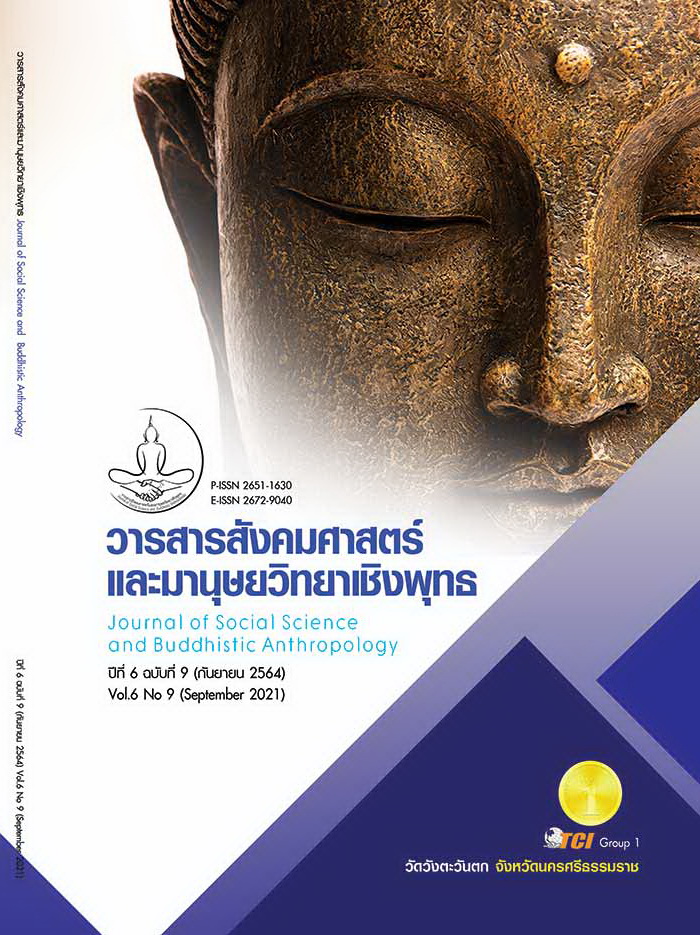DEVELOPMENT A PROGRAM TO SMART TEACHER IN PRIMARY SCHOOL UNDER THE DEPARTMENT OF LOCAL ADMINISTRATION
Keywords:
Program Development, Elementary School, Local Government OrganizationAbstract
The objective of this article is to 1) study the development of high-performance teacher development programs; Under the local government organization The sample consisted of 375 administrators and academic supervisors. Multi-stage sampling was obtained and the program was tested with 16 elementary school teachers, municipal schools, amusement parks. Including an assessment form Questionnaire and interview form The statistics used for data analysis were percentage, mean and standard deviation. The results of the research showed that 1) the satisfaction of the development of high-performance teacher enhancement programs in elementary schools. Under the local government organization The overall level was at a high level. 1.1) Program development activities for enhancing high-performing teachers in elementary schools. Local administrative organization after training by using time exchange of learning ( = 4.83 SD = 0.49) 1.2) Implementation of the program, step 3 (
= 4.78 SD = 0.52) and 1.3) training in conjunction with Work at the educational institution of the developing person. Step 2: (
= 4.74 S.D. = 0.54) 2) Implementation of high performance teacher enhancement programs in primary schools. Under the local government organization Individual score test results of teachers in elementary schools. Under the local government organization, teachers were found to have a pre-development score of 16.95 from a full score of 30, equivalent to 56.52 percent and a post-development score of 24.64 from a full score of 30, or 82.12 percent, indicating that primary school teachers. study The scores of local governments have higher post-development scores than before. A nd pass the criteria 80 percent of all people
References
กมล สุดประเสริฐ. (2548). แนวทางการพัฒนาอาจารย์ในระดับอุดมศึกษา. ใน รายงานการวิจัย. สำนักนโยบายและแผนการศึกษา สำนักงานเลขาธิการสภาการศึกษา.
กระทรวงศึกษาธิการ. (2560). สมรรถนะการศึกษาไทยในเวทีสากล ปี 2559 = IMD. กรุงเทพมหานคร: สำนักงานเลขาธิการสภาการศึกษา กระทรวงศึกษาธิการ.
ฑิฆัมพร บุญมาก. (2558). การพัฒนาระบบการพัฒนาครูในการจัดการเรียนรู้ของโรงเรียนขยายโอกาสทางการศึกษา. ใน ดุษฎีนิพนธ์การศึกษาดุษฎีบัณฑิต สาขาวิชาบริหารและพัฒนาการศึกษา . มหาวิทยาลัยมหาสารคาม.
พชรวิทย์ จันทร์ศิริสิร. (2562). สมรรถนะและการจัดการเชิงกลยุทธ์. ใน วิทยานิพนธ์ศึกษาศาสตร์มหาบัณฑิต สาขาวิชาการบริหารและพัฒนาการศึกษา. มหาวิทยาลัยมหาสารคาม.
วาสนา มะณีเรือง และคณะ. (2559). รูปแบบการพัฒนาครูเก่งครูดีของสถานศึกษาขั้นพื้นฐาน. วารสารสันติ ศึกษาปริทรรศน์ มจร, 30(2), 260-278.
วิจารณ์ พานิช. (2555). วิถีสร้างการเรียนรู้เพื่อศิษย์ในศตวรรษที่ 21. กรุงเทพมหานคร: มูลนิธิสดศรี-สฤษดิ์วงศ์.
สำนักงานคณะกรรมการการศึกษาขั้นพื้นฐาน. (2555). คู่มือประเมินสมรรถนะครู (ฉบับปรับปรุง). กรุงเทพ: สำนักพัฒนาครูและบุคลากรทางการศึกษาขั้นพื้นฐาน.
สำนักงานคณะกรรมการการศึกษาแห่งชาติ. (2559). การจัดการเรียนการสอนสำหรับผู้เรียนในศตวรรษที่ 21 . กรุงเทพมหานคร: สำนักงานคณะกรรมการการศึกษาแห่งชาติ.
สำนักงานเลขาธิการคุรุสภา. (2561). สมรรถนะ. กรุงเทพมหานคร: โรงพิมพ์คุรุสภา.
Krejcie, R. V. & Morgan, D. W. (1970). Determining Sample Size for Research Activities. Educational and Psychological Measurement, 30(3), 607- 610.









